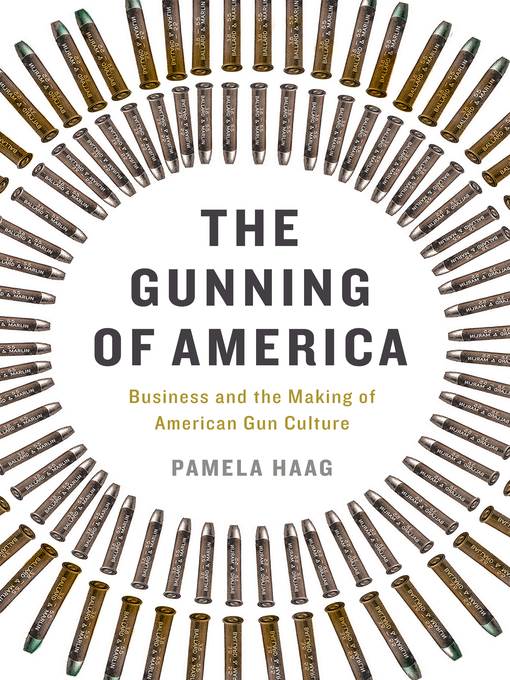
The Gunning of America
Business and the Making of American Gun Culture
کتاب های مرتبط
- اطلاعات
- نقد و بررسی
- دیدگاه کاربران
نقد و بررسی

Starred review from February 29, 2016
In this fascinating account, Haag (Marriage Confidential) traces the history of America’s gun-making business, arguing that “the tragedy of American gun violence emerged from the banality of the American gun business.” Oliver Winchester, known as “the rifle king,” who founded one of the first private armories in America in early 19th century, is the focal point of the narrative. As Haag notes, former clothier Winchester could just as easily have been remembered as the country’s “men’s shirt king.” The gun industry began with the colonial rebels’ need for more uniform weapons whose parts could be exchanged in the midst of battle. But reliance on government contracts during wartime proved an unreliable business model, forcing manufacturers to seek out other markets for the prodigious potential output of their military-scale factories. They began aggressive ad campaigns aimed to convince ordinary citizens that guns were something they needed to own. Haag offers some practical suggestions for curbing gun violence that involve treating weapons as a consumer product that should be regulated—noting the anomaly that toy guns are subject to safety regulations, while real guns are not. Both convincingly argued and eminently readable, Haag’s book will intrigue readers on all sides of the gun control debate.

February 15, 2016
An examination of the controversial realm of American gun culture through the perspective of gun manufacturers, with an emphasis on the Winchester Repeating Arms Company. Historian Haag (Marriage Confidential: The Post-Romantic Age of Workhorse Wives, Royal Children, Undersexed Spouses, and Rebel Couples, 2011, etc.) deliberately eschews detailed discussions about the Second Amendment, the rights of gun owners, the advocates of gun control, and other cornerstones of our current heated political debate. Instead, in each chapter, the author emphasizes that the United States became awash with handguns and rifles and other permutations of weaponry in large part because manufacturers saw potential markets for their products and then sold to those markets aggressively and effectively. Haag explores numerous manufacturers and their personnel, building her narrative mostly around 19th-century "rifle king" Oliver Winchester and his "less visible, more historically numinous daughter-in-law," Sarah Winchester. Oliver represents the bottom line-oriented businessman who thought little about the moral implications of selling a product meant to kill, while Sarah represents the second-generation tycoon haunted by those same moral implications. As Haag mixes a straight-ahead business saga with a soap-operatic tale of misfortune in spite of wealth, the opposing strands are not always well-integrated within the overall text. However, those threads are usually interesting, and the research is extensive. In an epilogue, Haag briefly addresses current gun politics, suggesting that imposing corporate accountability on gun manufacturers seems more productive than endlessly debating the rights of gun owners and what gun control partisans have a right to impose on those individual owners. It is important to recognize, she writes, "that gun violence and mass shootings are not really technocratic problems, to be most effectively solved through the correspondingly technocratic remedies of legislative campaigns that often fail, and that, in any event, tackle small facets of the problem." A refreshingly unusual approach by an author admirably transparent about why she wrote the book and why she chose to avoid more traditional approaches.
COPYRIGHT(2016) Kirkus Reviews, ALL RIGHTS RESERVED.

Starred review from April 1, 2016
Historian Haag (Marriage Confidential) powerfully protests the conventional notion of America's gun culture from the perspective of business, history, and human conscience, arguing that the modern firearm did not originate as an exceptional item or emotionally charged totem. The author emphatically rejects the idea that such a culture was forged out of the legacy of Daniel Boone, Revolutionary War patriots, the expansion of the Western frontier, the Second Amendment, or "American Individualism." Instead, the gun emerged as an ordinary 19th-century product that companies such as Winchester Repeating Arms or Remington Arms produced, marketed, and sold no differently than a plow or hammer. Focusing on Oliver Winchester and Co., Haag describes how gun sales were critical to the success of the business. To stimulate profits before World War I, manufacturers exaggerated the weapon's role to appeal to nonrural America; one that lamented the disappearance of an earlier mythical, romanticized, individualistic, and masculine landscape. Haag strongly believes that merchandise (especially guns) carries the burden of right and wrong, as exemplified in the tragic life of Sarah Winchester, heir to the Winchester fortune. VERDICT This important book speaks directly to the ideas that underpin the strident political debate on guns today. It will appeal to anyone interested in American history, business history, or modern politics.--Mark Jones, Mercantile Lib., Cincinnati
Copyright 2016 Library Journal, LLC Used with permission.

April 1, 2016
Haag, an award-winning historian and essayist, has turned a wide and deep lens to America's gun culture, focusing on it as an unexceptional commodity in our business history. We thus see it not as a matter of values of gun owners but of the makers, and triumph of nineteenth-century manufacturing and mechanical elegance. The central focus is on Oliver Winchester, who moved from shirt manufacturing before the Civil War to establishing interchangeability in mass-production lines for the self-repeating rifles of the Winchester Repeating Arms Company. Haag traces the business' story in the U.S. and the role of government forward into the military carnage of the twentieth century and today's civilian market. But she also develops a parallel trackthe effect of the vast Winchester-family wealth, provided by guns, on the conscience of Sarah, Oliver's daughter-in-law. It eventually led to massive extravagance, spiritualism, and mental imbalance. The author has smoothly brought together a huge amount of archival research, wide historical sources, and contemporary perspectives as recent as 2015. This book should attract many readers.(Reprinted with permission of Booklist, copyright 2016, American Library Association.)

























دیدگاه کاربران